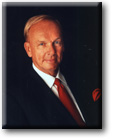
 Lowell "Bud" Paxson, Chairman
of Paxson Communications Corporation, is a media industry pioneer whose
broadcast career spans more than 40 years. Paxson's crowning achievement
is the creation of PAX TV, the nations seventh and newest broadcast television
network, which launched on August 31, 1998. With its nationwide broadcast
television and cable distribution system, including the nation's largest
group of owned and operated television stations, Paxson airs PAX TV, the
national family entertainment network.
Lowell "Bud" Paxson, Chairman
of Paxson Communications Corporation, is a media industry pioneer whose
broadcast career spans more than 40 years. Paxson's crowning achievement
is the creation of PAX TV, the nations seventh and newest broadcast television
network, which launched on August 31, 1998. With its nationwide broadcast
television and cable distribution system, including the nation's largest
group of owned and operated television stations, Paxson airs PAX TV, the
national family entertainment network. PAX TV is a realization of years of pursuing rigorous business strategies and some major strokes of good fortune. When, in March 1997, the Supreme Court upheld the "Must Carry" legislation, all of Paxson's UHF broadcast television stations were suddenly viable as a network, and accessible to cable television audiences. Throughout the course of the year, Paxson proceeded to refine and revise its network plans, with an eye on quality programming with values and another on opportunities for generating advertising revenue. The result is PAX TV, which presents a new economic paradigm for a new age of television, with the widest clearance of any launch in network history.
Paxaon's acumen for the business of broadcasting has been widely lauded. He is the recipient of 1997 Broadcaster of the Year Award presented by the Florida Association of Broadcasters; the NIMA International Lifetime Achievement Award (1997) from the Worldwide Electronic Marketing Association; the American Free Enterprise Award (1996), the Florida Entrepreneur of the Year Award (1994); the Northwood University Outstanding Business Leader Award (1998); and the Florida Atlantic University's College of Business Entrepreneur of the Year (1999). He built a television empire and created the electronic shopping industry, as a co-founder and President Emeritus of the Home Shopping Network and Silver King Communications. From 1991 to 1997, he assembled a 46 station radio empire, via the strategic acquisition and development of the largest group of radio stations and networks in Florida. In June 1997, Paxson Communications Corporation sold its radio interest to Clear Channel Communications of San Antonio, Texas, in a tax-advantage transaction. Following the sale, Paxson has turned his focus to television.
Paxson grew up in Rochester, New York, where as a teenager he held his first job in radio, retrieving records and coffee for disc jockeys. During his four years at Syracuse University, he was a radio announcer at several local stations.
The purchase of a radio station, WACK in Newark, New York, in 1956, marked the beginning of Paxson's experience as a station owner and provided for a forum for Paxson to develop his signature innovative management style and marketing savvy. Recognizing the value of the broadcast airwaves as a direct sales medium, in 1977 Paxson began selling merchandise on a Florida AM radio station.
Out of that experience grew the concept of the Home Shopping Network, which Paxson founded in 1982. By 1985, consumer response to electronic shopping was enthusiastic enough for Paxson to take Home Shopping Network national and create a public company, and in 1986, Paxson established the Silver King Communications group of broadcast television stations, growing the group to twelve stations, eight of which are in the top ten U.S. markets.
In 1990, Paxson sold his interest in HSN and Silver King and returned to radio with the purchase of his first station in Florida, WCRJ, mow WROO, in Jacksonville. Paxson took his company public in November 1994, through a reverse merger with the American Network Group, Inc., and subsequently moved the new company, Paxson Communications Corporation to the American Stock Exchange.
Paxson has continually demonstrated his ability to anticipate trends and changes in broadcasting's regulatory environment. As a result of agreements Paxson had in place on radio stations prior to 1993's FCC rule change permitting radio duopolies, the company was among the first to exercise its options and expand its duopoly holdings at very favorable acquisition prices. With the prospect of television duopolies on the horizon, Paxson has prepared his company to capitalize on further consolidation and has again established a leadership advantage.